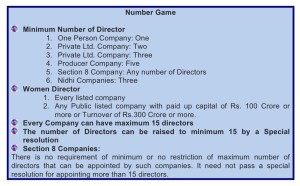
Introduction
Directors play a critical role in corporate governance. The company law provides for various categories of directors to help the company in its corporate governance. The encyclopedia of the corporate law is Companies Act, 2013 (“Companies Act”) that received Presidential assent on August 29, 2013, which extends to whole of India. The focus of the discussion is to understand how various categories of directors who share a fiduciary relationship with the company and are key position holder, whose duties are outlined in section 166 of the Companies Act are appointed in the company and how they can resign. In view of the corporate frauds and other issues, it is also important to understand, how a company can indemnify its director liability. The article focuses on the basic issue about the entry and exit of the company’s director and how far a company can take care of its director’s liability, in view of the changes in the Companies Act.
A. Appointment and Classification of a Director
Every company within one year of commencement is required to comply with provision under Section 149 (1) of the Companies Act, which says that the company should have board of directors. However, no person can be director of a company unless he is assigned a Director Identification Number (DIN). Broadly classification of Director can be made two fold- Executives and Non-Executive Director. The term non-executive directors find no reference either in the Companies Act, 1956 or the 2013 Act; however, the rules define an executive director as a whole-time director. Non-executive director is understood to be a director who is not involved in the day-to-day affairs of the company, and receives his remuneration by way of sitting fees and/or commission. The company atleast seven days before the general meeting should inform its members about the candidature of person for the office of director by serving individual notices on members through electronic mode to members who have provided their e-mail id and in writing to all other members. The service of notice can be substituted by the advertisement in the vernacular and English newspaper of the area where the registered office of the company is situated. The number of directors in different types of companies and the categories of directors is discussed below.

- Managing Director: Means a person who by virtue of the articles of the company or agreement with the company or resolution passed in its general meeting or by its board of directors is entrusted with the substantial powers and includes the directors occupying the position of the company. The appointment of a Managing Director is done under Section 196 of the Companies Act and the same is applicable to both public and private limited company. There is no compulsion for a private limited company to appoint a managing director or a whole time director throughout its life. The minimum age requirement is twenty-one years and maximum age is seventy years. The Managing Director is appointed for a period of five years. A person who has attained the age of seventy years can be managing director of the company, provided a special resolution to that effect is passed.
- Whole Time Director: Whole time Director in relation to a company means a Key managerial person appointed to devote whole time to the management of a company or its business. They are included within the purview of officer in default under the Companies Act.
- Nominee Director: The law provides subject to the articles of the company, the board may appoint a director nominated by any institutions or by agreement or by the Central or state Government by virtue of its shareholding in the government company. Section 161 (3) provides for the appointment of a nominee director.
- Independent Director: As per section 149(6) an independent director in relation to a company, means a director other than a Managing Director, Whole Time Director Or Nominee Director. Every listed public company is required to have atleast one third of total number of directors as Independent Director. Three major qualification identified by the Act for appointment as Independent Director is one who in the opinion of Board is a:
- A person of integrity
- Relevant expertise
- Experience
The period within which a public limited company can comply with the requirement of independent director is:
- One year from such commencement
- One year from date of notification of rules in this regard

Every independent director is also required to give declaration as to he meets the criteria of independence at three points of time:
- At the first meeting of board of directors in which he participates
- At the first meeting of every financial year
- Change of circumstances which may effect his independence
- Residential Director: As per Section 149(3) of Companies Act, every company shall at one director who has stayed in India for a total Period of not less than 182 days in the previous calendar year.
- Small Shareholder’s Director: A listed Company may have one director elected by small shareholders as provided under section 151 of the Companies Act. Such companies include those companies that have nominal value of shares upto Rs. 20,000/-.
- Additional Directors: The Companies Act empowers the Board of Director to appoint any Individual as an Additional Directors of a company other than person who fails to get elected as Director of the company in a general meeting.
- Alternate Directors:-As per Section 161(2) the Board of Directors may appoint, alternate director, if the articles of association so confer such power on company or a board resolution is passed in general meeting if a Director is absent from India for atleast three months.
- Shadow Director:-A person, who is not appointed to the Board, but on whose directions the Board is accustomed to act, is liable as a Director of the company, unless he or she is giving advice in his or her professional capacity.
B. Process of Resignation of A Director
As per section 168 of the Companies Act, 2013 which provides for the process of resigning from the Directorship of a private limited company requires:
 C. Understanding Director’s Liability under Companies Act
C. Understanding Director’s Liability under Companies Act
Some of the Corporate Frauds that India experienced stress on the importance of introspecting the responsibility of the board of directors towards the stakeholders and the company. So, any person carrying on business with intention to defraud the creditors of the company or with intention to commit fraud is liable under Indian laws.
In case of an offence committed by a company, apart from the company itself, the law makes relevant individuals accountable. This leads to a concept of “officer in default”, both in the 1956 Act, as well as under the 2013 Act. According to the 1956 Act, in Section 5, meaning of officer who is in default covers any person in whose accordance the board is accustomed to act. “A person being non -ED maybe held only if it can be proved that the current board of directors acts in accordance with his directions or instructions. Under Companies Act, 2013, section 149(12) states that non-executive directors or independent directors shall be held liable, only in respect of such acts of omission or commission by a company, which had occurred with his knowledge, attributable through board processes, and with his consent or connivance or where he had not acted diligently, provided he is not a promoter or Key Managerial Personal.
As per Section 128 (6), 129 (7) of the Companies Act, the managing director, the whole time director in charge of the finance, the CFO or any other person charged by the board with the duty of complying with the provisions under the sections contravenes such provision they are liable for punishment and fine under the Companies Act.

The old Companies Act provides avoidance of provisions relieving liability of officers and auditors of company under section 201. According to which, any provision, whether contained in the articles of a company or in an agreement with a company or in any other instrument, for exempting any officer of the company or any person employed by the company as auditor from, or indemnifying him against, any liability which, by virtue of any rule of law, would otherwise attach to him in respect of any negligence, default, misfeasance, breach of duty or breach of trust of which he may be guilty in relation to the company, shall be void except as provided under this section. Provided that a company may, in pursuance of any such provision as aforesaid indemnify any such officer or auditor against any liability incurred by him in defending any proceedings, whether civil or criminal, in which judgment is given in his favor or in which he is acquitted or discharged or in connection with any application under section 633 in which relief is granted to him by the Court. There is no counterpart of section 201 in the new Companies Act.
D. Understanding Liability & Indemnification of Directors and Officers
The Companies Act, 2013 makes it clear that the person who resigns from the directorship of a company shall still be liable for offences committed during his tenure as director. In the following circumstances, a director/person in charge of the affairs of the company can also be prosecuted, along with the company as an accused:
- If there is sufficient evidence of his active role coupled with criminal intent;
- Where the statute specifically imposes liability.
Offence: As per section 3(38) of General Clauses Act, 1897 “Offence” shall mean any act or omission made punishable by any law for the time being in force.
Liability of Outgoing Director in a Cheque Bounce Matter Section 141 of the Negotiable Instrument Act dealing with Cheque bounce matters and provide for offence committed by company. This section provides that the company and the person at that time in charge of the affairs liable for the Act. He can be absolved from his liability only in scenario where he has no knowledge or had exercised due diligence for avoiding the same. But any act whose commission involves connivance or consent of such outgoing director then also his liability can be fixed. The prosecution against company is not tenable in law without impleading the company.
Can a Director be made liable for the acts of his Co-Directors? A Director is the agent of the company, except for matters to be dealt with by the company in General Meeting and, not of the other members of the Board. Accordingly, except in one instance, nothing done by the Board can impose liability on a Director, who did not participate in the Board’s action or, did not know about it. To incur liability, he must either be a party to the wrongful act or, later acquiesce (consent) to it. Thus, the absence of a Director from a meeting of the Board does not make him liable for the fraudulent act of a co-Director, on the ground that he ought to have discovered the fraud, except where he had the knowledge or, he was a party to confirm that action.
Liability Of Director Of Company Under The Income Tax Act, 1961 While discussing the liabilities of the Directors under the Indian laws, the provisions of section179 of the Income Tax Act, 1961 (“ITA1961“) are also noticeable. Section 179 of the ITA1961 is applicable only to private companies. The liability of the directors of a private company for the payment of tax due from the company is made joint and several if tax cannot be recovered from the company. This section however enables a director to establish that the non-recovery of tax is not attributable to any gross neglect, misfeasance or breach of duty on his part in relation to the affairs of a company to avoid such a liability. The burden to establish this rests on the director concerned and only if the burden is discharged that director can be exempted from the tax liability of a company imposed on him by s.179 of the ITA1961.
Regarding the Contracts entered to by the Director: Contract entered by the Director of the company are binding on the Company, if the same is within his actual authority or if the same is within his article of association of company or companies bye-laws or internal rules of management.
Breach of Duties of Director: The 2013 Act states that breach by a director of the provisions of section 166, which provides for duty of director, is also punishable with a minimum fine of Rs. 100,000 (which may also extend to Rs. 500,000). There is, however, no specified process or procedure in which the company may bring an action against erring directors for an alleged breach of any of the duties of directors in section 166. A company may exempt its directors from liability (by way of indemnity or otherwise by way of directors and officers insurance) in connection with any breach of duty in relation to the company, as the 2013 Act does not specifically prohibit such exemptions.
Many insurance companies are providing cover to director and insurance liability. The D&O policy provides cover for the personal liability of Directors and Officers arising due to wrongful acts in their managerial capacity. Defence costs are also covered and are payable in advance of final judgment. The insurance policies provides protection for claims brought against directors, officers and employees for actual or alleged breach of duty, neglect, misstatements or errors in their managerial capacity.
Some of the specific exposures that make D&O insurance necessary for the Directors and Officers are:
- Vulnerability to shareholder/stakeholder claims
- Sexual harassment, discrimination allegations and other employment practice violations
- Regulatory investigations
- Accounting irregularities
- Exposures relating to mergers and acquisitions
- Corporate Governance requirements
- Compliance with various legal statutes
The cover applies to former, present and future members of the board of directors, the management and any employee performing a managerial or supervisory role.
Exclusion in Liability Generally
- Any bodily injury, sickness, disease or death of any person or any damage to tangible property
- Dishonest, fraudulent, criminal or malicious act.
- Personal guarantee.
- Libel and slander
- Personal injury and damage to property.
- Pollution damage
- Directly resulting from goods or products manufacture or sold by the company
- Fines, penalties, punitive or exemplary damages.
- Any circumstances existing prior to inception date of policy
Premium
Premium depends on profile of the client, the Sum Insured selected, present and past functioning of the company, information in the balance sheet and annual report, degree of exposure etc.
Conclusion
- India is having highest percentage of corporate frauds
- Every company within one year of commencement is required to comply with provision under Section 149 (1) of the Companies Act, which says that the company should have board of directors.
- No person can be director of a company unless he is assigned a Director Identification Number (DIN). Broadly classification of Director can be made two fold- Executives and Non-Executive Director.
- The company atleast seven days before the general meeting inform its members about the candidature of person for the office director.
- Dos and Don’t to be an Independent Director needs special attention.
- DIR-11 and DIR-12 is form for resignation of director.
- The D& O cover applies to former, present and future members of the board of directors, the management and any employee performing a managerial or supervisory role.












